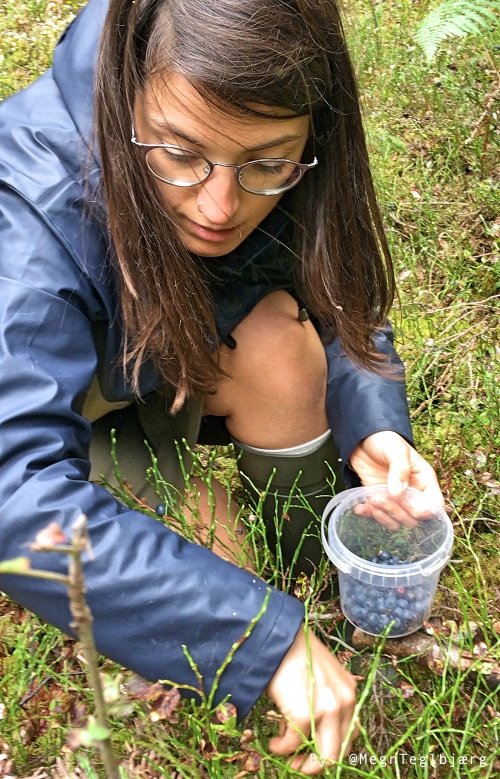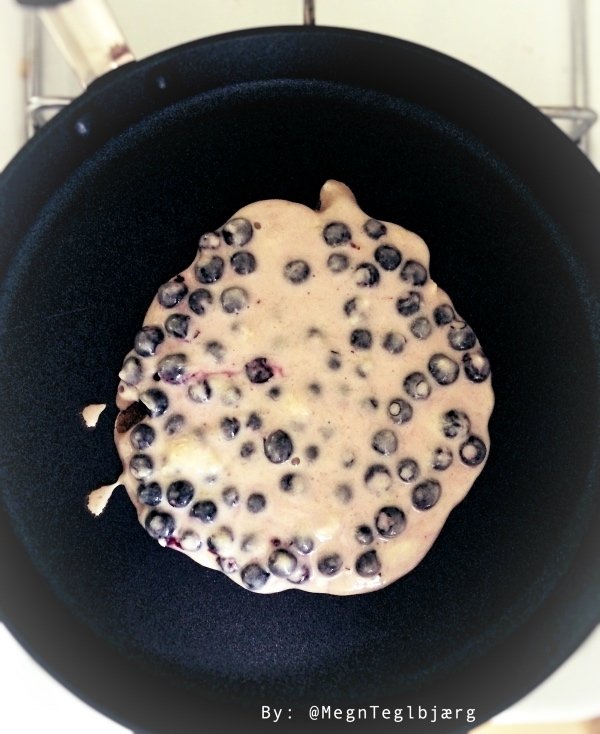The blueberries grew rampant, covering a large area of the forest floor (see my previous post to find out which forest floor I am talking about). I was ecstatic. Wild blueberries have always held a special place in my heart, as I have many fond family memories associated with them.
So as my husband David and I walked through highways of blue, I couldn't help but feel a flood of happiness and warmth fill my body.
Besides the memories, have I also other good reasons to love blueberries: they are little nutritional bombs of goodness, low in fat, pumped full with antioxidants and a good source of vitamins C and K.
Healthy and delicious, fresh plucked berries, whats not to like! Plus being out in nature, exercise, fresh air - I am definitely not complaining!

There were so many blueberries and so little time! Not only were was our vacation in the woods all too short, but so is the lifespan of vitamins, especially vitamin C, in which blueberries have quite a bit.
Vitamin C is one of the most, if not the most ephemeral vitamins that our body needs. What this ultimately means is that plants (and in my case blueberries) containing vitamin C, contain most of the vitamin before it is tampered with by human hands.
Its not because you forgot to wash your hands, or because you have some weird smell - it is simply the nature of the vitamin.

As soon as the fruit is plucked, the amount of vitamin C available begins to diminish.
Yes, this means unfortunately that most of 'fresh' produce we buy in the supermarkets is not beaming with exuberant amounts of the vitamin.
And unfortunately, neither is that week old bag of spinach you got hanging out in your fridge.
Not only is storing vitamin C rich foods in the fridge, slowly eating away at the poor C, so does chopping or blending, boiling or frying.
Like I said, this vitamin really doesn't like being tampered with.
But than again, in most western countries is lack of vitamin C in our diets hardly the epidemic it was back in the days of great ships and explorations.
A varied diet including lots of fresh fruits and vegetables should definitely cover it.
But if it is a concern for you, or you have an idea that you could boost your intake her are some pointers for maximising the C:
- frozen produce usually maintains its high levels of vitamin C. Consider adding some frozen blueberries and spinach to a smoothie in the morning. Not only is the vitamin C contain a little higher, but the combination of spinach (iron) and blueberries (vitamin C) help the body absorb iron better.
- Pluck fresh. If possible, find local farms, green areas or other possibilities for coming outdoors and plucking fresh from the tree, bush - whatever! The fresher the better. Northern Europe as well as parts of North America are soon (if not already) prime-time for plucking.
- Try buy local, and use a short time after purchase; preferably within 2-3days.
- Eat lots of fruits and vegetables. Kiwi, blueberries, berries in general, spinach, oranges etc. Eating from the fruit and veggie rainbow should ensure your body gets what in needs in form of vitamin C.
But if today is just one of those days, where vitamin C isn't your first priority and all you want is some blueberry pancakes, all I can say is - do it. Sometimes you just got to live a little a little on the wild side, hehe. Vitamin C isn't the only thing blueberries are good at!

Luckily for us, this wasn't the only batch I got to eat that week in my blue and green paradise. I also took a few liters home to decorate the insides of my freezer. Oh yeah, and jam, because well peanut butter and jam never gets old. 😏 😏 😏
Ciao for now, Sweet Steemers
🌸 🌱 🌸
Where there is love there is life.
- Mahatma Gandhi
agreed <3